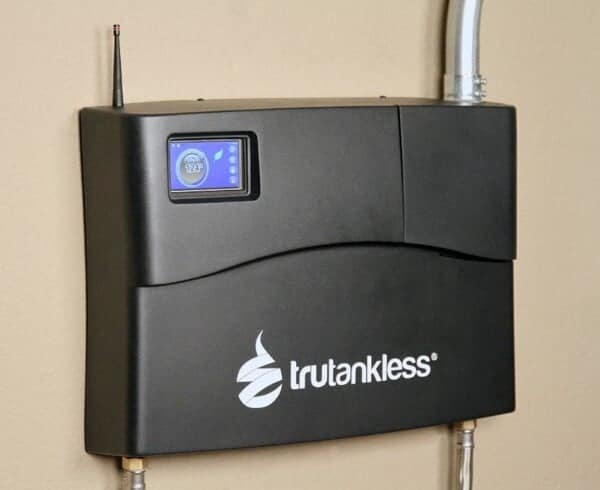Most folks are stunned to learn that the average shower consumes close to 18 gallons of water. To put that in perspective, your average RV water tank is good for about 6 gallons (maybe 10 gallons) of water.
There’s just no way to enjoy that kind of shower – or multiple showers – in an RV without switching to one of the best electric tankless water heater setups. The best tankless heaters provide water on demand, can infinitely refill, and are often a lot more compact (and a lot more efficient) than traditional options.
In this detailed guide, we run through what you should be looking for in a new tankless water heater for your RV, the benefits (and the drawbacks) of these units, and highlight a few of our favorite picks you want to consider for your RV going forward.
Let’s get into this!
RV Tankless Water Heater 101
Tankless water heater technology is quite different from traditional tank systems in a couple of different ways, none quite as evident as the fact that they don’t have dedicated water tanks holding hot water in reserve.
Instead, water is pumped through a system of snaking pipes that are independently heated to get your water up to temperature on demand – pushing hot water to your showers (and any other faucet on your RV) every time you need it.
This is a game-changer for a couple of reasons (not the least of which is the always on-demand and nearly unlimited hot water you’ll have access to), but we get into some of those in just a minute.
At the end of the day, though, new tankless water technology in your RV allows you to take longer and more comfortable showers and guarantees that you’ll have plenty of hot water available for other things.
Get a FREE copy of the Go Together Go Far Travel Trailer Hookup and Disconnect Checklist when you sign up for the Go Together Go Far Newsletter!
Don’t forget to check out our Recommended RV Equipment list!
Benefits (and Drawbacks) of Tankless Water Heaters
Your tankless technology will forever change the way you use hot water in your RV. But you must understand the significant benefits and the drawbacks of this system before you make the switch.
(Almost) Unlimited Hot Water
The most significant and most obvious benefit of switching to a tankless water heater in your RV is that it can provide (almost) unlimited hot water on demand.
You will never have to worry about taking the second or third shower of the day only to find the water ice cold.
Instead, every time you flip the faucet to the hot water side, you’ll get exactly what you’re looking for – so long as you still have water in your reserve holding tanks (or are connected to water at the campsite).
Significant Weight Reduction
A full hot water tank will weigh quite a bit, with every individual gallon adding 8.3 pounds of weight to your RV. If you have a 10-gallon tank on your RV, that’s an extra 83 pounds.
You’ll burn a lot more fuel with extra weight, but you’ll also have to dedicate space in your RV to accommodate all that excess water.
With a tankless setup, you’re only looking at adding between 10 and 30 pounds of extra weight to your RV. That’s it – you have almost infinite and on-demand hot water anytime you want it with a significant weight reduction.
Even and Consistent Water Temps
One of the most incredible things about a tankless setup in your RV is the precise regulation of water temperatures you’ll enjoy.
Traditional tank systems inevitably have hot and cold spots. And while most do a pretty good job of delivering consistent temperatures, you have to deal with some fluctuations when you run them long enough.
That’s never a problem with a tankless system.
You get exactly the kind of hot water you’re looking for (give or take 2° or 3°F °) every time you turn the faucet on.
Protection from Freezing
Tankless water heaters provide you with outstanding protection against freeze-ups as well.
Traditional RV water tanks have to be winterized every year. You’re not going to have to worry about that with a tankless system. Not to the same degree, anyway.
Lower Flow Rates
On the flip side, you should expect lower flow rates than what you’d get out of a traditional tank water system.
It’s not anything crazy, but it will be a little noticeable (at least at first).
Requires Consistent Power
You’ll need to provide consistent power to your tankless system to keep the water and move it through the tankless setup.
We are talking about a ton of power regularly. But it can need more power than your tank required in the past.
Can Be Expensive Initially
Finally, because tankless technology is so new – and because it is so popular – you should probably expect to pay a premium to get this hardware installed in your RV.
Prices will come down (eventually), but this is still one of the most significant drawbacks.
Our Best Electric Tankless Water Heater for RV Picks
Fogatti RV Tankless Water Heater

Compact, lightweight, but still incredibly convenient to use, this is one of the most popular RV tankless water heaters money can buy for a couple of different reasons.
This 55,000 BTU system can heat water up to 123°F in record time and has a maximum flow output of nearly 3 gallons per minute. All of that combines with one of the most energy-efficient systems in the tankless water world (at least for RVs, anyway) to produce something special here.
Furrion RV Tankless Water Heater

Capable of delivering on-demand temperatures of up to 125°F without any trouble, this 60,000 BTU system has a slightly lower GPM rating than the one above – 2.5 gallons per minute compared to 3.0 – but that doesn’t mean it’s a slacker.
Not by any stretch of the imagination.
Proprietary “vortex” technology consistently mixes the water you are heating on-demand to produce a more consistent and even temperature control system.
On top of that, this rig is set up to provide piping hot water even when ambient temperatures drop to 32°F or lower – keeping your system running even in freezing temperatures.
Stiebel Eltron RV Tankless Water Heater

Maybe the most popular of all the top RV tankless water heater systems, you’ll never have to worry about your showers on the go being interrupted with cold water ever again.
Ridiculously compact, this system can tuck away almost anywhere and requires absolutely zero venting whatsoever. Near silent operation allows you to take showers in the middle of the night without disturbing fellow campers – in your RV or out – and you won’t have to worry about chewing up extra energy with this unit.
Closing Thoughts
Upgrading your water heating system in an RV to a tankless option is a major quality-of-life improvement.
However, finding the right unit is a huge piece of that puzzle. This isn’t something you want to get wrong.
Luckily, armed with the inside information above (and our recommended options), you should be able to shortcut this process without worrying too much.
By all means, read about and research different options if you’d like. But the chances are pretty good you’re going to double back and want to get your hands on one of the units we mentioned earlier.
They are just that good!
Don’t forget to check out our Recommended RV Equipment list!
Want to learn more about different types of RVs? Check out:
- Best Off-Road Camper Trailer Under $10,000
- Best Bunkhouse Travel Trailer Under 30 Feet
- Are Lance Travel Trailers Any Good?
- Do Rope Lights Deter Rodents?
- What Are the Best Names in the RV Industry?
- 3 Best Travel Trailers for Family of Four
- Blue Ox SwayPro Basics: Top Questions Answered
- Adding A Washer Dryer To Travel Trailer? What You Need To Know.
- Best Drone For Camping, Backpacking, and RVing: A Complete Guide to Drones for RVers
- Furniture and RVs – How To Get It Through the Door…
- How To Get Rid Of A Poop Pyramid In RV Black Tank
- Do You Know How Long To Keep Fresh Water In RV Tank Storage?
- What Is The Best Outdoor Security Camera System For Your RV?
- RV Bumper Mount Grills: 5 Best Options For Your RV Or Camper
- Best Electric Tankless Water Heater for Your RV. What You Need To Know
- Read Before You Buy! How to Find the Best Scooter for RV Camping
- 3 Best Travel Trailers for Family of Four
- Top RV Brands: What Are the Best Names in the RV Industry?
- Lance Campers: What Makes Them So Different?
- Best Bunkhouse Travel Trailer Under 30 Feet
- Best Off-Road Camper Trailer Under $10,000
- Best Weight Distribution Hitch With Sway Control For Travel Trailers in 2022
- What Are The Best Built Travel Trailers? Things To Consider.
- How Does An RV Refrigerator Work? A Quick Guide.
- Why Does My RV Carbon Monoxide Detector Keep Beeping? A Quick Guide.
- Where Is The Power Converter In My RV Or Travel Trailer
- What is the Best Generator for 50 Amp RV?
- Wireless RV Security Camera Systems: Is Solar Powered Security Without Wi-Fi An Option?
- Best Portable Air Conditioner for Camping for 2022
- How to Find the Best 3500 Watt Inverter Generator for RV Camping
- Best Propane Generator For Your RV: Read This Before You Buy!
Featured image used via CC BY 4.0 from Scott Lewis

